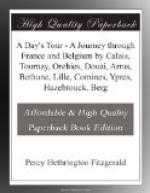The Mass being over, the Swiss, a tall, fierce fellow, arrayed in a feathered cocked-hat, rich scarlet regimentals and boots, now showed an extra restlessness. The Bishop of Douai, a smooth, polished prelate, began his sermon, which he delivered from a chair, in clear tones and good elocution. When the ceremonies were over, the whole congregation gathered at the door to see the young ladies taken away by their friends. Then I resumed my exploring.
On a cheerful-looking place, which, with its trees and kiosque, recalled the Place Verte at Antwerp, I noticed a large building of the pattern so common in France for colleges and convents—a vast expanse of whiteness or blankness, and a yet vaster array of long windows. It appeared to be a cavalry barrack for soldiers. The bugles sounded through the archway, and orderlies were riding in and out. This monotonous building, I found, had once been the English college for priests, where the celebrated Douai or Douay Bible had been translated. This rare book—a joy for the bibliophile—was published about 1608, and, as is well known, was the first Catholic version in English of the Scriptures. Here, then, was the cradle of millions of copies distributed over the face of the earth. It was a curious sensation to pass by this homely-looking edifice, with the adjoining chapel, as it appeared to be—now apparently a riding-school. I also came upon many a fine old Spanish house, and toiled down in the sun to the Rue des Foulons, where there were some elaborate specimens.
Short as had been my term of residence, I somehow seemed to know Douai very well. I had gathered what is called ‘an idea of the place.’ Its ways, manners, and customs seemed familiar to me. So I took my way from the old town with a sort of regret, having seen a great deal.
VII.
ARRAS.
It is just eleven o’clock, and here we are coming to a charming town, which few travellers have probably visited, and of which that genial and experienced traveller, Charles Dickens, wrote in astonished delight, and where in 1862 he spent his birthday. ‘Here I find,’ he says, ’a grand place, so very remarkable and picturesque, that it is astonishing how people miss it.’ This is old Arras; and I confess it alone seems worth a long day’s, not to say night’s, journey, to see. It is fortified, and, as in such towns, we have to make our way to it from the station by an umbrageous country road; for it is fenced, as a gentleman’s country seat might be, and strictly enclosed by the usual mounds, ditches, and walls, but all so picturesquely disguised in rich greenery as to be positively inviting. Even low down in the deep ditches grew symmetrical avenues of straight trees, abundant in their leaves and branches, which filled them quite up. The gates seem monumental works of art, and picturesque to a degree; while over the walls—and what




